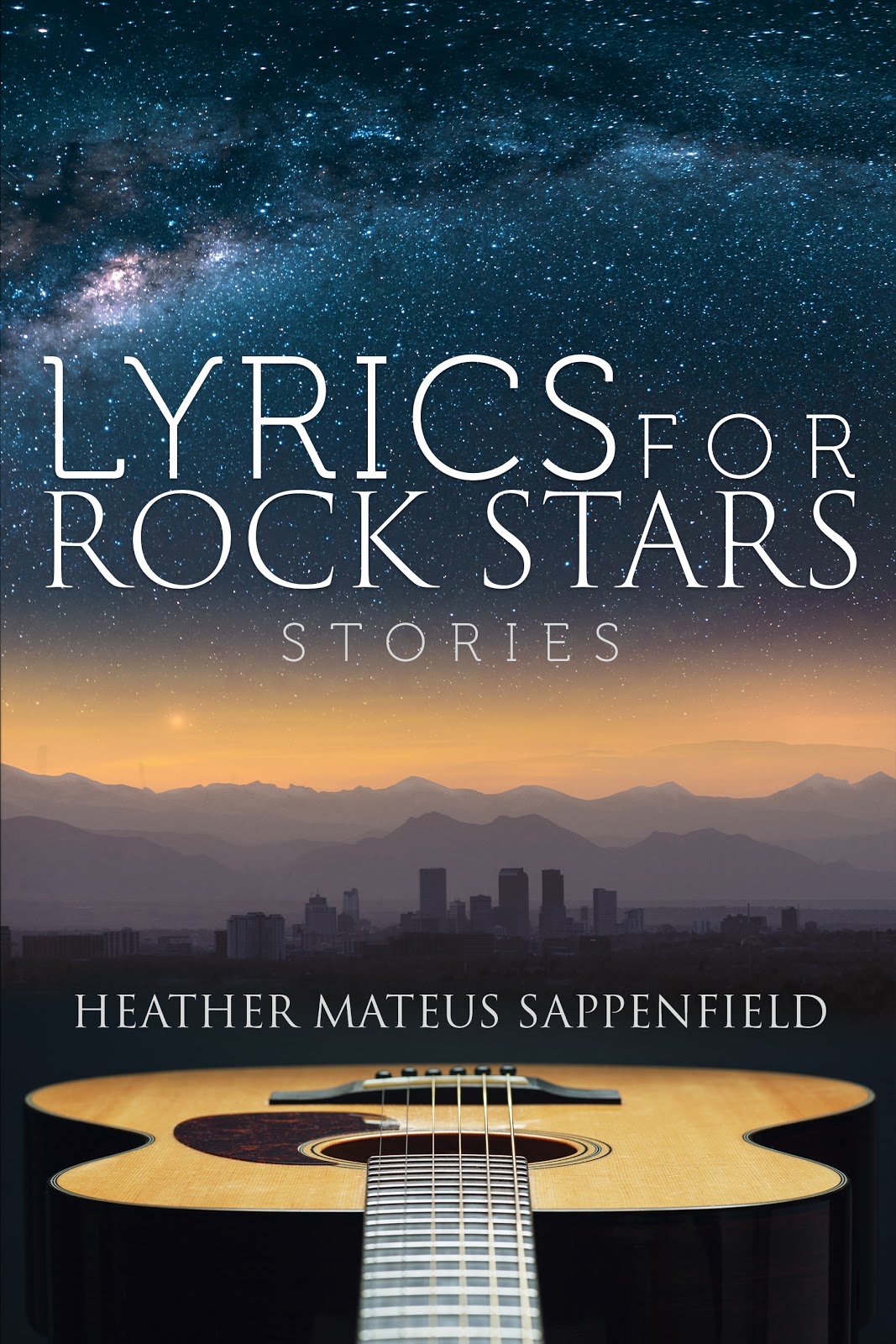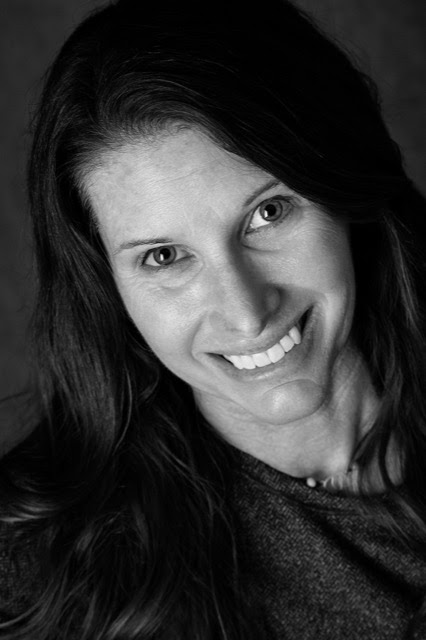FOR IMMEDIATE RELEASE:
Sappenfield traces women’s stories across generations in “Lyrics for Rock Stars”
 VAIL, Colorado– Tracing the complex unfolding of generations throughout history, paying particular attention to women’s stories, and children who are often wise beyond their years, Heather Mateus Sappenfield brings dynamic characters to life in a bold collection of stories.
VAIL, Colorado– Tracing the complex unfolding of generations throughout history, paying particular attention to women’s stories, and children who are often wise beyond their years, Heather Mateus Sappenfield brings dynamic characters to life in a bold collection of stories.
“Lyrics for Rock Stars” (V Press LC, Sept. 21, 2020) is a collection of seventeen stories―some historical, some contemporary—all set in the West. Involving skiers, ranchers, cyclists, suffragettes, tourists, super models, dead pigs, burro racers, religious beet farmers, immigrant miners, scorned lovers, penitent centenarians, and musicians, these stories are as varied as the region’s landscape. Funny, poignant, and resonant, each tale explores how society’s values clash with our individual desires, and the ways we weave our lives through these opposing forces. This collection will make you cry. It will make you laugh out loud. Above all, it traces hope through the long unfolding of generations and time.
Each story is compelling in its own right, and together, they rise in harmonic commentary on the West’s past and present, on its women who populate both, each straining desperately to find her own song.
“An exploration of the inner lives of marriage and mountain towns, the stories in Lyrics for Rock Stars rise like the foothills to meet the peaks…Sappenfield knows the modern West.”
—Nicole Magistro, owner, Bookworm of Edwards & 2015 judge, Kirkus Prize for Fiction
“Lyrics for Rock Stars”
Heather Mateus Sappenfield | Sept. 21, 2020 | V Press LC | Short Stories; Literary
Paperback | 978-1-7330488-5-9 | $17.97
About The Author
 HEATHER MATEUS SAPPENFIELD: Heather Mateus Sappenfield’s writing explores the adventures that fill life, often in the Rocky Mountain landscape that has been her lifelong home. She’s fascinated by the many selves each of us becomes in our varied roles throughout the day (some we like, some we do not), and her writing often delves into the internal adventure of juggling those multiple selves. Among the many accolades her fiction has received are the Danahy Fiction Prize, the Arthur Edelstein Prize and three Pushcart Prize nominations. Her work has also been recognized as a finalist for the Flannery O’Connor Award, the Kraken Prize, and the Colorado Book Awards. “Lyrics for Rock Stars” is her first short story collection. To learn more about her life and work, visit: https://heathermateussappenfield.com.
HEATHER MATEUS SAPPENFIELD: Heather Mateus Sappenfield’s writing explores the adventures that fill life, often in the Rocky Mountain landscape that has been her lifelong home. She’s fascinated by the many selves each of us becomes in our varied roles throughout the day (some we like, some we do not), and her writing often delves into the internal adventure of juggling those multiple selves. Among the many accolades her fiction has received are the Danahy Fiction Prize, the Arthur Edelstein Prize and three Pushcart Prize nominations. Her work has also been recognized as a finalist for the Flannery O’Connor Award, the Kraken Prize, and the Colorado Book Awards. “Lyrics for Rock Stars” is her first short story collection. To learn more about her life and work, visit: https://heathermateussappenfield.com.
In an interview, Heather Mateus Sappenfield can discuss:
- How she adapts her fiction writing to particular audiences and niche genres
- Why the Rocky Mountain landscape and its history play such an important role in her storytelling, and how living in Vail has influenced her writing in unexpected ways
- Her approach to writing women characters throughout history—how they’ve been treated, yet also how they’ve chosen to perpetuate certain roles themselves
- Why—in a life filled with adventure—writing is her bravest pursuit
- How her literary career defies boundaries
An Interview with Heather Mateus Sappenfield
1. Where did the idea for this collection come from? How long have you been working on these stories?
All of the stories have roots in my life, yet each one quickly and thoroughly sprouts into fiction. I wrote the first one, “Coloring Beyond the Lines,” after leaving my high school teaching position to stay home with my daughter, taking my first wobbling steps toward becoming a serious writer as she took hers. After several near misses with editors at magazines, I headed to Pacific University’s MFA in Writing program to hone my craft; seven of the collection’s stories came from there. Just before graduating, “Empty Feast” was runner up for an award, then “Indian Prayer” won the Danahy Fiction Prize, and I thought, Well, I’m a real author now, but being an author isn’t about writing to the end of a story, or awards; like raising a child, it’s about patiently beckoning and allowing it to unfold into its greatest potential. Post-MFA, I continued writing short stories, eventually entering the collection in some contests, where it was a finalist over and over. Until one day, around my daughter’s twentieth birthday, their overarching themes—the way they spoke beyond themselves—finally became clear to me— surprising me, honestly, and allowing me to fully understand that body of work. And then it won!
2. Your stories trace through historical time periods as well as modern day settings. What connections do you see between the past and the present?
We are creatures woven into legacies—familial, cultural, historical—and, whether we realize it or not, acknowledge it or not, our actions are guided by these threads. I feel life’s greatest adventures, the ones that require the most courage—lie in recognizing how these histories affect us, and then in having the fortitude to accept or reject them according to our personal truths, which often leads to conflict with society, others, ourselves. For this reason the settings of my stories usually have as much influence as any character.
3. Why was it important to you to weave hopeful themes throughout this collection?
I don’t write for catharsis, or to create art, rather to forge a bond with a reader. Foundational to this connection is an implicit agreement that is present in each story’s first words, in how its characters and settings are brought to life, in how their conflicts play out. This relationship invites a reader to lift, from how I arrange mere letters on a page, an emotional investment in a character, and from this to then glean insight into their own lives. It’s beautiful magic. The word “hope” literally means to want something to happen or be true, and I believe most of us hope, at the least, that an inkling of grace waits at the far side of struggle. Providing this in return is my gift to readers.
4. Can you describe your fascination with the many selves each of us becomes in our varied roles throughout the day, and how your writing delves into the internal adventure of juggling those multiple selves?
Imagine someone brushing her teeth, staring at, yet not actually seeing, her reflection in the bathroom mirror as she contemplates the hectic day ahead. See her kiss her husband—whom she’s had a spat with—goodbye, a peck on the cheek, maybe. See her smile and wave to her neighbor as she drives away, then honk at and tailgate the car that pulls out in front of her, then enter her school, smooth her skirt, and greet her class of kindergartners. Most of us similarly pinball between multiple roles each day—a slow, complex erosion of personal integrity—and the how and why of it fascinates me, especially the narratives we create for ourselves, about ourselves, to justify and align them.
5. What can readers expect to see from you in the future? Do you have any other projects in the works?
When a story comes to me—it usually arrives in near entirety—and there’s usually a voice that determines its narration, characterization, scope. The River Between Hearts, the story of an eleven-year-old girl discovering a terrified Mexican classmate hiding in her tree fort because her family has been deported, needed to be told from a child’s perspective, thus as middle-grade fiction. The novel was recently the runner-up for the Kraken Prize at Fitzroy Books and will be released in spring 2022.
On a completely different note, I’ve just finished Spoonfuls, a humorous adult novel in which a 38-year-old woman trapped in adolescence, and an 83-year-old woman trapped in aging, meet in a moment of desperation. The unlikely friendship they forge leads to a race, a journey, and a quest. Above all, their bond guides them both beyond the lives they’ve been conditioned to believe define who they are, to the selves they were truly destined to become. It’s a book that traces the evolving ways women have been shaped by American history and culture, yet even more by their own concepts of themselves. I’m currently deciding if I want to enter it in a contest or seek an agent.

A former award-winning journalist with national exposure, Marissa now oversees the day-to-day operation of the Books Forward author branding and book marketing firm, along with our indie publishing support sister company Books Fluent.
Born and bred in Louisiana, currently living in New Orleans, she has lived and developed a strong base for our company and authors in Chicago and Nashville. Her journalism work has appeared in USA Today, National Geographic and other major publications. She is now interviewed by media on best practices for book marketing.

